گزیده ای از کتاب صلح
همه میدانیم و بر این باورم که براي آزادي، آرامش و رفاه نسبي، انسان نميتواند در بستر نرم بنشيند تا آرزوهايش در اين همه گريز و ناگزير از دست برود. شایسته است، دوباره نگاهی بیندازیم، به زندگيِ سراسر مبارزهي متفکران و اندیشمندانی که برای صلح و آزادی و عدالت، از جانشان گذشتند…
در آغاز کتاب صلح می خوانیم
فهرست
معرفی همکاران ادبی جشنواره بینالمللی شعر صلح و همکاران فنی: 26
يادداشت براي نخستين جشنوارهي شعر صلح.. 54
پيام از تاجيكستان دكتر نورعلي نوريزاد. 58
بکتاش آبتین Baktash Abbtin)). 61
علیرضا آبیز حسنی (Alireza Abiz) 63
آناليزا آدولوراتو(Annelisa Addolorato) 65
محمد آشور (Mohammad Ashour) 70
اُلیویا آگوستینی (Olivia Agostini) 73
روزه آوسلندر (Rose Ausländer) 75
پیروز ابراهیمی (Pirooz Ebrahimi). 76
مسعود احمدی (Masoud Ahmadi) 79
کبوتر ارشدی(Kaboutar Arshadi) 81
محمد اسدیان (Mohama Asadian). 82
منصوره اشرافی (Mansoureh Ashrafi). 83
محمدهاشم اکبریانی (Mohamad Hashem Akbariani ). 84
نرگس الیکایی ( Narges Elikaee ). 86
محمد الأمين ( Mohamed Al-Ameen). 87
سودابه باباگپ (Soudabeh Babagap) 92
مارگوت اس. باومان (Margot S.Baumann ). 95
فانوس بهادروند (Fanous Bahadorvand) 97
نازنين بهادريNazanin Bahadori ) ). 98
سیمین بهبهانی (Simin Behbahani). 101
ژانیس پریات (( Janice Pariat. 108
عبدالله پشیو (Abdulla Pashew). 109
مزدک پنجهای (Mazdak Panjei) 111
مارگریتا پوپلین لاوینو (Margarita popeline SL). 112
طيبه پوراكبر خياوي(Nigar Khaiavi). 113
فرهاد پیربال ( Farhad pirbal). 114
سید رسول پیره ( Seyed rasol Pire) 115
پیتر تابیت جونز (Peter Thabit Jones) 116
غزل تاجبخش (Ghazal Tajbakhsh) 118
شهیر تاجیکی (Shahir Tajikii). 119
احترامالسادات توکلی (Ehteram sadatTavakoli). 120
علی ثابتقدم( Ali Sabet ghadam). 121
ستار جانعلیپور ((Satar Janaliy Poor. 122
ترانه جوانبخت، (Taraneh Javanbakht) 124
شاپور جورکش (shapoor jorkesh). 125
روجا چمنکار (Roja Chamankar). 126
آلیس چووین (Alice Cehovin) 128
سان.کی.چیتوگه ( ( Sankichi TOGE.. 131
محمدرضا حسنبيگي (Mohamad reza Hasanbegi). 133
عباس حسیننژادAbbas Hoseininejad) ). 134
احمد حیدربیگی، (Ahmad Hedar bigee) 135
مرتضی حیدری آل کثیری ( Morteza heidari al kasiri ) 137
اسکندر ختلانی(Askndr Khtlany). 138
خالد خشان (Khaled Khashan). 139
محمد خليلي (Mohamad Khalili). 140
بهزاد خواجات (Behzad Khajat). 141
مریم خونساری (Maryam Khonsary ) 142
دراگان دراگولوویچ (Dragan Dragojlovic) 144
محمدصادق دهقان (Mohammad sadegh Dehghan) 145
ستِوا رايچکويچ(Steva Raickovic). 148
میشائیل رایدیک (Michael Reidick). 149
مهری رحمانی (Mehri Rahmani). 151
سهراب رحيمی (Sohrab Rahimi) 153
بهاره رضایی(Bahare Rezaei) 155
گابریل روزنستاک (Gabriel Rosenstock) 157
میلنا رویایی (Milena Royaee). 158
محمد زندی (Mohammad Zandi) 159
ماندانا زندیان (Mandana Zandian) 160
زینگونیا زینگونه (Zingonia Zingone). 161
دکتر راتی ساکسنا ( Dr. Rati Saxena) 163
ناهید سرشگي (Nahid Sereshki). 164
فخرالدین سعیدی (Fakhredin Saeedi). 167
دکتر پروین سلاجقه (Parvin Salajegheh). 168
غاده السّمان (Ghada Samman). 169
کاوه سمیعی (kaveh samiei). 172
تیرین سومتز (Triin Soomets) 173
فرامرز سهدهي(Faramarz Sehdhy). 174
سروناز سيدي (Sarvenaz Seyadi). 175
محمدعليشاكرييكتا (Ali Shakeri Yekta Mohammad). 178
مهري شاهحسيني (Mehri Shah-Hosseini) 181
دکتر فتحالله شفیعزاده(Dr. Fatollah Shfyzade). 182
ساغر شفیعی (Saqr Shafiee). 183
مختار شکریپور (Mukhtar Shkrypor). 184
حسن صفدري (Hassan Safdari). 191
دکتر ایرج صفشکن(Dr.Iraj Safshekan). 192
عمران صلاحی (Emran Salahi). 193
گلناز طاحری(Golnaz Taheri). 195
زهرا طهماسبي (Zahra Tahmasebi) 196
ملکتاج طیرانی (Malektaj Taiarani) 198
محمود عبدالغنی (Mahmoud Abdul Ghani). 203
محمود عبدالغنی (Mahmoud Abdul Ghani). 204
علی عبدالهی (Ali Abdollahi) 205
افسانه عزبدفتر (Afsaneh Azab Daftar). 207
مليحه عزيزپور(Malihe Azizpoor) 208
محمد عزیزی (( Mohammad Azizi 209
مریم علاء امجدی (Maryam Ala Amjadi) 210
دکتر علی غضنفری (Dr. Ali Ghazanfari) 214
حوری غمیان (Houri Ghamian) 217
فهيمه غنينژاد (Fahimeh Ghaninejad) 218
سایز مور فایSays Moor Fay.. 220
رحيم فروغي (Rahim Foroghi ). 223
فرانك فريد (Faranak Farid). 224
عبدالعظيم فنجان(Abdolazim Fenjan). 226
مهرنوش قربانعلي (Mehrnoosh Ghorbanali) 228
رمکو کامپرت (Ramco Campert) 232
ناهید کبیری (Nahid Kabiri ). 236
استیونس کراسکیان (Stivens Keraskian). 237
زلاتکو کراسني(Zlatko Krasni) 238
علیرضا کرمانی (Alireza Kermani) 240
دکتر رام کریشنا سینگ (Ram Krishna Singh) 241
مری کرین دیر (Mary Krane Derr) 243
اودویگ کلایو (Odveig Klyve) 246
سوداکو کوری هارا(Sadako KURIHARA) 248
عباس کیارستمی (Abbas Kiarostami) 250
ماریا کیچن(Mari küchen) 252
جواد گنجعلی (Javad Ganjali ). 254
دکتر گابریلا گوتیه رز(Gabriella Gutiér rezy Muhs) 255
اشتان لافلویر (Stan Lafleur) 258
شمس لنگرودي (Shams Langrodi). 260
آنا لومباردو (Ana Lombardo) 263
ماری .تی مارتین (Marie T. Martin) 266
ویتو مارکوویچ Vito Marković)). 267
دكتر جواد مجابى (Javad Mojabi) 268
عبدالوهاب مجیر (Abdulvahab Mojiri). 269
آیدا محصولی (Aida Mahsoli) 270
اعظم محقق (Maha Mohaghegh) 271
شیدا محمدی ) (Sheyda Mohammadi 272
عیسی مخلوف (Eiss Makhluf). 273
کریستوفر مریل (Christopher Merrill) 276
نصرتاله مسعودی (Nosratolah Masoudi). 278
اقبال معتضدی(Eghbal Motazedi) 282
محمود معتقدی (Mahmoud Motaghedi). 283
داریوش معمار (Dariush Memaar). 285
محمد مفتاحی (Mohamad Meftahi). 286
سید ضیاء موحد (Movahed Zia). 287
سارا مؤیدی (Sara Moayedi). 288
کودمیر میلنویچ (Cedomir Milenovici) 289
برانكو ميلهكوويچ (Branko Miljkovic). 291
بهروژ ناکرهیی (Nacrhee Behrouge). 293
آرش نـصرتاللهی (Arash Nosratollahi) 296
رحمان نوازني (Rahman Navazeni). 297
دکترنورعلی نورزاد (Dr.NurAli Nurizad). 298
صفورا نيري (Safura Nayeri). 301
صلاح الوديع (Salah Alvadya). 304
تامیکی هارا Tamiki Hara) (Mr. 308
چیستا یثربی (Chista Yasrebi). 309
SECRETARY OF THE FESTIVAL.. 331
An Account of the Work and the Editor:
از عزیزانی که دعوتِ صلح را پذیرفتند سپاسگزارم. باید بگویم انتخاب شعر در این مجموعه بسیار دشوار بود، زیرا انتخاب شعری از یک کشور، گاه به دلیل مرتبط نبودن با موضوعِ صلح، ناگزیر به حذف آن کشور منجر میشد. آثاری که برای شرکت در دور اول این جشنواره ارسال شده بود، حجم بسیار بالایی را داشت. چنانچه پیش از این در مطبوعات نیز آمده بود، نزدیک به4000 اثر بررسی شد. بیشترین شرکت کنندگان از ایران و شاعرانی از: آلمان، آمریکا، انگلیس، ایتالیا، افغانستان، تاجیکستان، فرانسه، عراق، سوریه، لبنان، مراکش، هندوستان، ترکیه، نروژ، آلبانی، هلند، ژاپن، صربستان مونته نگرو، یوگسلاوی (سابق) و… که بخشی از این آثار در این مجموعه دیده میشود، برخی در مجلد دیگری به چاپ خواهد رسید.
شرح حال این جریان نوپا که نخستین حرکت ادبی و مسقل از سوی ایران بود در این چند سطر نمی گنجد؛ اما آنچه مهم است شنیدنِ صدای صلح به زبانهای مختلف است، که در این مجموعه دیده میشود. شاید این توضیح کافی باشد، بعضی ناشران از انتشار گزیدهی این اثر ( به دلیل حجم زیاد) امتناع داشتند. بعد از فراز و فرودهای بسیار بر سر راه انتشار این کتاب، جناب علیرضا آبیز، دوست گرانمایه(شاعر و مترجم) اشعار فارسی را که قبلا بعضی از شاعران، توسط مترجمان مختلفی ترجمه کرده بودند؛ بررسی و مجددا ترجمه کردند. چنین راه دشواری در ابتدا طی شد، چند زبانه بودن این اثر به دو زبانه بودن (فارسی و انگلیسی) تقلیل یافت. متاسفانه بعد از کاری طولانی، این امر نیز به سرانجام نرسید و قرار شد، این اثر را فقط به زبان فارسی در حجمکمتری در ایران و زبان انگلیسی آن را درخارج از کشور به چاپ برسانیم. علیرغم میل باطنیام دست به این کار زدم. گرچه پسندیده نبود، اثر را پراکنده کنم در هر حال بعد از جدا سازی و کاری جانفرسای، این تلاش هم بیثمر ماند و موجب پریشانی و دلسردی هدف شد. بعد از هفت سال کار روی این پروژه که مورد تبعیضِ همهجانبه و فراموشی قرار گرفته بود؛ تصمیم گرفتم این اثر را که امروز راحت در دستِ شما ورق میخورد، در یک روز بهاری و با شکوه، روبروی نمایشگاه بینالمللی کتاب، همراه با کتابهای بلاتکلیفِ دیگرم، برگ به برگ آتش بزنم تا از وجود نداشتهی صلح، در جامعه در امان بمانم. این خودسوزی که از عمر ده سالهاش میگذرد ( به دلایل مختلفی…) اتفاق نیفتاد و به سکوت و سکوت گذشت. در این سکوت طولانی، توانستم سه رمان را به اتمام برسانم و… بگذریم. در همین خلوت بود که گاهی بزرگوارانی بزرگ، احوالی از کتاب صلح میپرسیدند؛ دوست بزرگوارم جناب دکتر علی غضنفری که خود نیز غم صلح دارند، از اوضاع کتابِ صلح و شرایط من با خبر شدند، با همت ایشان قرار شد، اثر را فقط به زبان فارسی منـتشر کنم. با همهی دلسردی، دوباره دست به کار شدم.
افت و خیزها بسیار بود. شیرازه کتاب دوباره به هم ریخت، هفت ماه دیگر روی این اثر کار شد. این گونه شد که نباید میشد. کاری دشوار که از عهدهی چندین دستیار بر میآمد، و من بسیار تنها بودم. آری، چند بار و چند بار و چند… هر بار که چیدن این اثر را فقط برای یک زبان آماده میکردم و از چند زبانه بودن (هدف اصلی) دور میشدم؛ اندوهی سنگین، سنگینتر از ابر پاییزی بر من و برگهای این اثر میبارید و وادارم میکرد، هر چه ضربه میخورم، به رگبار این زمانه تسلیم نشوم. آیا به دلیل نداشتن سرمایه برای صلح و سنگ اندازیهای بیشمار، هدف از بین خواهد رفت؟ هر روز با چیدن صفحهای یا سطری، راه تازهای پیدا میکردم. چند زبانه بودن، تلاشی بود که از ابتدای بیداری صلح در من آغاز، و به آن فکر شده بود.
آیا خورشید در سرما، رنگ میبازد؟
هدف حتا اگر کمرنگ، سایهای از نور است.
در نهایت این تحفهای ست برای زندگی در صلح، خواه شایسته، خواه بیراه و پُر زحمت. نمیدانم! با سپاس ویژه از دوست بزرگوارم جناب علیرضا آبیز، دکتر علی غضنفری، و حمایتِ مترجمان دیگر و جناب علی احمدی خرم (سازنده تندیس) و کمکهای مالی ایشان در هر مقطعی از جشنواره؛ صلح مدیون عزیزانِ بیشماری است.
این شرحِ حالِ ناگفتهای است از جوهرهی زنِ ایرانی، شاعری خونِ دل ریخته بر برگی سفید، شاعری که به خوبی میداند، برای نگهداری، ارزش و سلامت هر جریان رو به رشد و مستقل، به ویژه صلح، دچار حسدِ نا آگاهان و تبعیضِ کژ اندیشان خواهد شد. هر چه هست، میدانم این تعلیق و محدودیت، برگُردهی این جشنوارهی نو پا برداشته خواهد شد. شاید کسی در این نابسامانیها شاد بشود از خاموشیِ صلح … نه، نه!
هیچ کس از فرهنگ رو به انحطاط، شاد نخواهد شد!
تاریخِ شعر ایران، گواه رنجهای امروزِ ما است. من باور دارم یک گام همهی راه نیست و راه با قدم برداشتن ثابت نمیماند. راه افتادن اگر چه دشوار در گِل ماندن هرگز!
توضیحات:
* این کتاب با مضمون گردآوری فاصله دارد، همانطورکه از تفکر اثر پیداست، جنبشی بالنده در شعراست؛ سالهاست بر آن تاکید دارد، شاید طرحی بیادعا اما ادامه داراست،
بنا دارد جلد سوم را نیز منـتشرکند.
* بعضی از شاعرانِ ایرانی که شعرشان را در سال 1384 برای شرکت در مسابقهی “ستایش از صلح” به این جشنواره ارسال کرده بودند؛ در سالهای بعد برای چاپ در این مجموعه، شعر بهتری را همراه با ترجمه ارسال کردهاند. لازم به ذکر است، تعداد انگشتشماری از شاعرانِ ایرانی در بخش مسابقه شرکت نکرده بودند و به صورت مهمان شعرشان را به این مجموعه ارسال داشتهاند. اسامی شرکتکنندگان قبلا در وب سایت جشنواره منـتشر شده بود.
* نکتهی بسیار مهم: این مجموعه به دنبالِ نام و آوازهی شاعران نبوده و نیست. بیوگرافی و زندگی شخصی شاعران، هیچگونه ارتباطی با این اثر صلحطلبانه ندارد؛ همانطورکه در “منشور شعرِ صلح” نیز آمده و به آن متعهد است.
* متاسفانه نام بسیاری از شاعرانِ عزیز ایرانی و خارجی به دلایل مختلفی… از جمله بیارتباط بودن با موضوع و به دلیل حجم محدود کتاب از آوردن زبان اصلی بعضی از شعرها خودداری شده است.
* این اشعار از سال 1384 در چند مقطع زمانی مختلف، توسط شاعرانِ ایرانی، خارجی و نمایندگان ِکشورهای دیگر به منظور چاپ و کپی رایت (اثر شاعرانِ خارجی) به این مجموعه تعلق دارد. هرگونه استفاده از این اشعار ممنوع است. تنها با کسب اجازه از دبیر جشنواره و ناشر این مجموعه، امکانپذیر است.
ری را عباسی
17/ اسفند/1390
An Account of the Work and the Editor:
I would like to offer my gratitude to one and all, all those, who accepted the call of peace. Selecting poems for this anthology was a difficult task, as I often found it impossible to include some of the international poetry submissions because they simply did not address the issue of peace. And indeed, we were blessed with many submissions. In the first edition of the festival, about four thousand poems were read. Most submissions were from Iran and Germany, United States, England, Italy, Afghanistan, Tajikistan, France, Iraq, Syria, Lebanon, Morocco, India, Turkey, Albania Norway, Netherlands, Japan, Serbia and Montenegro (former Yugoslavia), and others followed.
A selection of the submissions is included in this collection and the rest will appear in another volume. The account of this literary movement, which was the first independent one initiated by Iran, cannot be summarized in a few lines. What is important, however, is the ability to hear the voice of peace in different languages, which is now a possibility in this collection. Perhaps it would suffice just to mention the reluctance of many publishers to publish this potentially large book that included the work of so many poets from so many countries. After numerous unsuccessful attempts at “finding a publisher”, a very dear friend of mine, poet and translator, Mr. Ali Reza Abiz, eventually undertook the great task of reading the Persian poems, previously translated by other translators, only to alter and retranslate some of them. Due to various complications, at first we had to forgo our decision to publish a multilingual anthology and aim for a bilingual edition. Despite all of the hard work, however, we finally had to settle for a smaller volume in Persian in Iran and another in English abroad, all in spite of my heartfelt wishes and my disinclination to maim the entirety of the collection.
Nonetheless after the heartbreak of such measures and the toil of translation work, we were still far from reaping any results. Seven years of work was met with indifference, discrimination, and overall negligence. So one fine spring morning, to secure myself from the absence of peace in the society, I decided to set fire to the manuscript of this very book that you now hold and leaf through its very pages with ease, along with a few other manuscripts that awaited publication at the International Book Fair.
This decision that was made ten years ago was also not carried through due to different reasons and died in silence. However, in this long period of silence I was able to finish three novels and it was during this time of silence that some of my dearest friends often asked about the state the book of peace poetry was in. My dearest friend, Dr. Ali Ghazanfari, who was also longing for peace, became aware of my situation and the circumstances of the book and with his assistance we decided to make the book ready for publication. Despite of all my disappointment and disbelief, I began to prepare the book for publication, only in Persian. There were numerous struggles along the way. Again the binding of the book was disarranged and consequently, another seven months was spent working on the book. Everything that was not supposed to happen happened. It was a difficult task meant for a number of people, whereas I was all alone. Moreover, every time that I prepared this work for the monolingual publication (only in Persian) and drifted further away from my main purpose for this book to be published as a multilingual literary work, an extreme pain took hold of my being like a heavy autumn rain falling down on me and the pages of this book, which forced me not to give up on this dream despite of all the hostility of our time. Will this purpose be destroyed due to the lack of financial assets for peace and the numerous obstacles along the way? Every day I thought of a new plan as I lay every page or every line of this book. The multilingual feature of the book was an aspect I thought about from the beginning of my work for peace.
Will the sun lose its color in the cold?
Even if the purpose is pale in color, it is still a shadow of light.
In conclusion, this is a gift for living in peace. Whether it is worthy, unsatisfactory, or troublesome, I do not know.
I would like to express my sincerest gratitude to Dr. Ali Ghazanfari and Mr. Ali Reza Abiz and also for the support I received from other translators. I would also like to thank Mr. Ali Ahmadi Khorram (the creator of the statue, which represents “the Poetry of Peace) for his financial support of the festival. Peace is indebted to numerous people.
This is the untold account of the essence of Iranian women and of a poetess, who knows the meaning of suffering, one who knows that in order to preserve the value and well-being of a flourishing independent movement especially when dealing with peace, she will be faced with the envy and discrimination of unaware malicious souls. Whatever it is, I believe that this suspension and chaos will be lifted form our newborn movement. Perhaps in this chaos, there is someone, who would be pleased by the silence and death of peace… But, no, never… No one would be pleased by the sight of their culture moving towards decadence.
The history of Iranian poetry is witness to the sufferings of our present day and I believe that a journey is not made up of merely one step and the path will change as we take the steps. Although, beginning a journey is a difficult task, it is better than being stuck in one place.
Clarifications:
- The main purpose of this book is not by any means concerned with the matter of presenting a collection, but as it is evident from the idea behind this work of literature, it is a significant poetic movement that we have insisted on for many years; it is a form of research or an continuous project with no pretensions, which aims to publish even a third volume if it is not standing alone.
- Some Iranian poets, who sent their poems to the festival in order to enter a competition, entitled “The Eulogy of Peace” in 2005, sent even better poems along with their translations in the years after in order to be included in this anthology. It is worth mentioning that only a few of Iranian poets did not enter this competition and have submitted their poems for this collection as guests. The names of the competitors were published on the festival’s website.
- A very important fact: The purpose of this anthology has not been and is not now the name and the fame of the poets. The biography and the personal lives of these poets has nothing to do with peace and this peace-seeking work of literature as it is also mentioned in the regulations of “The poetry of Peace.”
- If some of the names of the Iranian poets or the poets from abroad is absent in this collection, it is due to the irrelevance of the poems to the subject of peace or the length of their poems (some of the poems are not included in their original language, but only in Persian due to the limited capacity of the book).
- The publication rights and copyright of these poems by different Iranian poets or poets from abroad belongs to this collection since 2005. Using the poems included in this anthology is only possible with the author and publisher’s permission.
Rira Abbasi
English: Farya Mohammadkhah
نگاهی به شعرِ صلح
A Glance at the Poetry of Peace
بنیانِ”جشنوارهي بينالمللي شعر صلح” با فراخوانی به هفت زبان در سال 1384پیریزی شد. این دوسالانه يكي از جشنواره های مستقل در ایران است، که با حضور شاعرانی از كشورهاي مختلف نخستین بار درتاریخ 26/2/ 1386در تهران برگزار شد. اين امر بسيار مهم و معنوي، زماني امكانپذير شد كه هنرمندانِ ايراني و خارجي، دعوت ما را به صلح پذيرفتند و هر كدام گوشهاي از اين كار پُر زحمت و خودجوش را به دوش كشيدند. اگر قلم و همتِ بزرگانِ اين ديار نبود، بيشك، روياي فروخوردهاي بود كه از پس ديوارِ خشونت به مرگ تدریجی ادامه ميداد.
اكنون بسيار خوشحال و مفتخرم، كه شاعران با شعرشان، نويسندگان با پيامشان، مترجمان با ديگر زبانشان، روزنامهنگاران، به تكثير خبري، طراحان، به خلق تصويري، صنعتگران با تجسمي از زبانِ فلز (تنديس صلح) و هيئت داوران با قضاوتي شاعرانه ملزم به رعايتِ “منشورِ شعر صلح” شدند. و همه از صلح گفتند. من از جواناني كه براي اولين بار از سرعت ارتباطات (فضاي مجازي اينترنت) سخن گفتند و مرا با اين فضا آشنا كردند و در خدمت صلح بودند، بسيار آموختم. از اديبان و مترجماني كه در خارج از ايران به ترغيب يك شاعر و گاه گردآوري اشعار كشورشان پرداختند؛ فروتني آموختم. در نهايت از كسي كه بهرغم همهي فشارها خانهي هنرمندان را در تاریخ ذکر شده به هنر صلح مهمان كرد، جناب بهروز غريبپور، هنرمند گرامي سپاس فراوان دارم.
بايد اعتراف كنم، بعد از هولناكي راه، گاهي احساس ميكردم، استخوانهايم از فرط كار و مسئوليت عرق ميريزند و كارم از عرقريزي روح گذشته است. فكر ميكردم، چه چيزي تواناتر، مرا به اين راه فراميخواند؟ شايد مهمترينشان:
- بيزاري از تهديد و خشونتِ مسلط بر جامعه و جنگ بود.
(تهديد هرروزهي آمريكا و… و…) احساس خطر ميكردم. براي اعتراض و وقوع هر اتفاقِ ناخوشايندي كه هر روز زندگيمان را به تلخي بيشتري خواهد كشاند؛ با صلح تنهای تنها شدم و پناه بردم به جمع تواناتر از خودم، در صلح گم شدم.
گرچه پي بردن به اين واقعيت كه ساختِ دشمن مناسبترين بازي و ادامهي سلطه است و… با انتشار فراخوانهايي به زبانهاي مختلف در سايتها و روزنامههاي رسمي كشور، دست به کاری زدیم که بايستهي هنر و هنرمند است كه در چنين شرايطي پيشگام حركت كند.
- با نگاهي به اين احساس که پيشرفت تكنولوژي، ماهيت زندگي حماسي را تغيير خواهد داد و در اين مسير ناگزیر شعرهاي حماسي، عشقهاي حماسي و حماسه، دچار سوءظن خواهند شد و… و میبايست تلاش كنيم که از خشونت انسان بر انسان بكاهيم و با جسارت و شجاعت، هشداري باشيم بر زورمداراني كه به تكنولوژي سلاح كشتار جمعي رسيدهاند. شايد روزي اين كتاب را زير تانك بگذارند و خواب كودكي را آشفته كنند؛ شايد رویایی بيش نباشد كه هنوز آرمانگرايان خوابِ عدم خشونت ميبينند در بيداري، که به خرد به زبان و فرياد جمعي دل ميسپارند؛ مثل شعر صلح، موسيقي صلح و نقاشي صلح (کبوتر صلح) اثر نقاش بزرگ پيكاسو که او نیز باور داشت؛ بالاترين نيكي، بهروزي بشر است.
- همه میدانیم و بر این باورم که براي آزادي، آرامش و رفاه نسبي، انسان نميتواند در بستر نرم بنشيند تا آرزوهايش در اين همه گريز و ناگزير از دست برود. شایسته است، دوباره نگاهی بیندازیم، به زندگيِ سراسر مبارزهي متفکران و اندیشمندانی که برای صلح و آزادی و عدالت، از جانشان گذشتند… گاهی به مهاتما گاندي نگاه میکردم. شاید هنوز در ما، مهاتما، مادر ترزا… وجود داشته باشد. زندگي واحدي تجزيهناپذير است (گاندي)
- پرسش دوباره و مهم تر اینکه، چه چيزي تواناتر، مرا به اين راه فرا ميخواند؟
صلح، شاعران، مترجمان و هنرمندانِ عزيزی را در آغوش داشت که سالهاست براي انديشه و فرهنگ ِصلح با هنرشان تلاش كردهاند.
در این سطرکوتاه، با زباني به قدمتِ فروتني، از عزیزانی که نامشان مُعرفِ صلح است و مرا در این راهِ ناهموار، همراه بودهاند؛ صمیمانه سپاسگزارم.
در پایان و در این اثر، اگر نام كسي به اين قلم نيامده، مرا به فراموشي متهم كنيد، بهتر از غرضورزي ست. از كساني كه هرگز نديدمشان و با كلامي مهرآميز جان دوبارهاي به پيكر بيحمايت صلح دادهاند تا بتوانيم به اين رويا بيشتر بپردازيم وكاري كنيم كه افتخاري باشد، براي ايرانِ عزيز، سپاس فراوان دارم.
شايد به گفتهي هنرمندانِ كشورهاي ديگر، ما آغازگر اين حركتِ بينظير بوده باشيم. اميدواریم بتوانيم در سايهي امنيت رواني به اين حركت شاعرانه ادامه دهيم.
18/6/1390
A Glance at the Poetry of Peace:
The foundation for “The International Festival of Peace Poetry”
was established in 2005 through invitations in seven different languages.
This biennial festival is one of the independent festivals in Iran, which was held on May 16, 2007 with the attendance of numerous poets from around the world. This significant and spiritual matter became possible, when Iranian artists as well as artists from abroad accepted our invitation of peace and each undertook a fragment of this strenuous and spontaneous task. If it was not for the skill and ambition of the great people of this country, without a doubt it would have remained a dream, suppressed by violence that went to die.
Today, I am extremely content and proud that all the participants were faithful to the regulations of “The Poetry of Peace”, and all spoke of peace, the poets through their poems, the authors with their message, the translators via their second language, the journalists by spreading the news, the draftsmen by designing the image and the craftsmen by creating the statue, representing “The Poetry of Peace”, and the jury through their poetic judgment.
I learned tremendously from the young people, who spoke of the velocity of communication made possible by the internet, familiarized me with it, and were of assistance to peace. The scholars and translators from abroad, who made an effort to persuade poets or collect the poetry of their country, taught me to be modest, and finally I would like to offer my sincerest gratitude to esteemed artist, Mr. Behrouz Gharibpour, who in spite of all the pressures, held “The International Festival of Peace Poetry” at “The House of Artists” on the afore-stated date.
I must confess that with the difficulty of this path, and the intensity of the work and the heavy responsibility, it took blood, sweat, and tears to complete this project. I sometimes thought to myself, “What is this powerful force that leads me to this path?” Perhaps, the most important reasons for this force were:
- My resentment towards the threats and violence, which dominated the society and the war such as the everyday threats of the United States. I was fearful of any incident, which would each day lead our lives towards more unpleasantness. So, in order to show my objection, I took shelter among those more powerful than me and lost myself in the work for peace and in the process, I realized this fact that creating the enemy is known to be the best game plan that results in the extension of the domination. Through the publication of invitations in different languages on websites and in the official newspapers of the country, I took on a task, which I believe it to be the duty of artists, who should take the lead in situations such as this.
- Having in mind that with the improvement of technology, the essence of epic life will change and someday in this path epic poems and epic loves will be doubted, we must try to decrease the extent of violence humans allow upon each other and with audacity and courage, be a warning to the tyrants, who have access to mass destruction weapons by the means of technology. Perhaps someday this book may be laid beneath a tank and destroyed, the voice of peace would remain unheard and the violence against children would continue or perhaps this is nothing more than a dream that still the idealists are dreaming of a life without violence and in wakefulness they rely upon wisdom, their voice, and their unanimous cry such as the “Poetry of Peace”, the music of peace, and the painting of peace by the great painter, Picasso, who also believed that the greatest virtue is man’s prosperity.
- Everyone is aware of and I believe in the fact that to gain freedom, tranquility, and relative comfort, one cannot remain idle until one’s dreams are lost in this world of elusion and inevitability. It is fruitful to once again take a glance at the intellectuals’ lives of constant battle, who gave up their lives for peace, freedom, and justice. I often looked at Mahatma Gandhi’s life and thought that perhaps there might still be a being such as Mahatma or Mother Theresa inside us.
“Life is an indissoluble unit.”
Gandhi
- And the more important matter was the essence of this force more powerful than me that lead me to this path. It was the efforts of the poets, translators, and artists that fought for the idea and culture of peace, whose names represents the concept of peace and who stood beside me along this difficult path. I would like to offer my sincerest appreciation to all of them.
In the end and in this work, if a name is not mentioned, blame me for my forgetfulness rather than spitefulness. I would like to thank all of those, who I did not get the chance to meet in person, who with their kind words once again gave life to the defenseless image of peace in order for us to pursue this dream and do something, which would make the people of our beloved country, Iran, proud. Perhaps as the artists of other countries stated, we might have been the initiators of this great movement and I hope that we are able to continue this poetic movement, sheltered by mental security.
Rira Abbasi
Translator: Farya Mohammadkhah

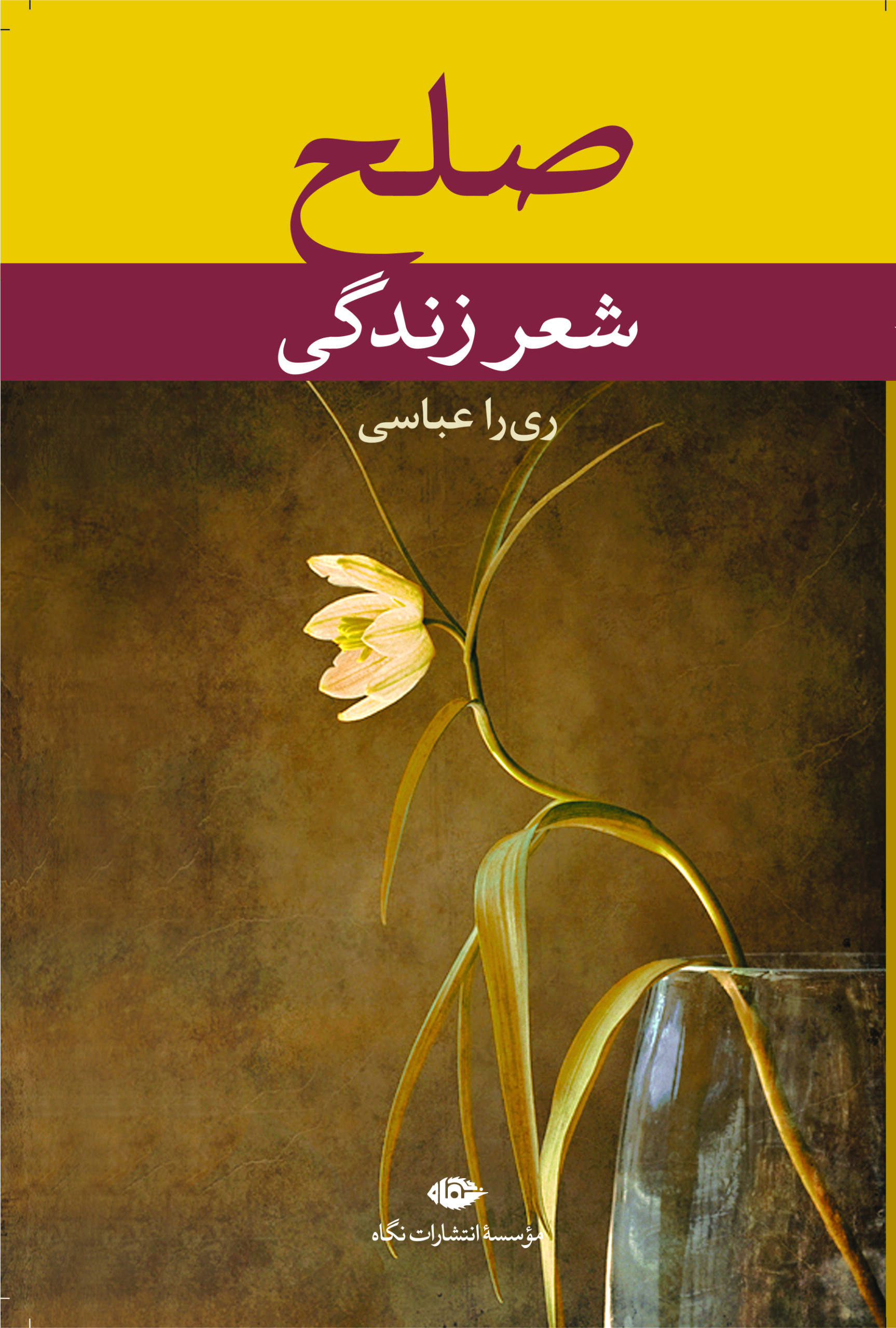
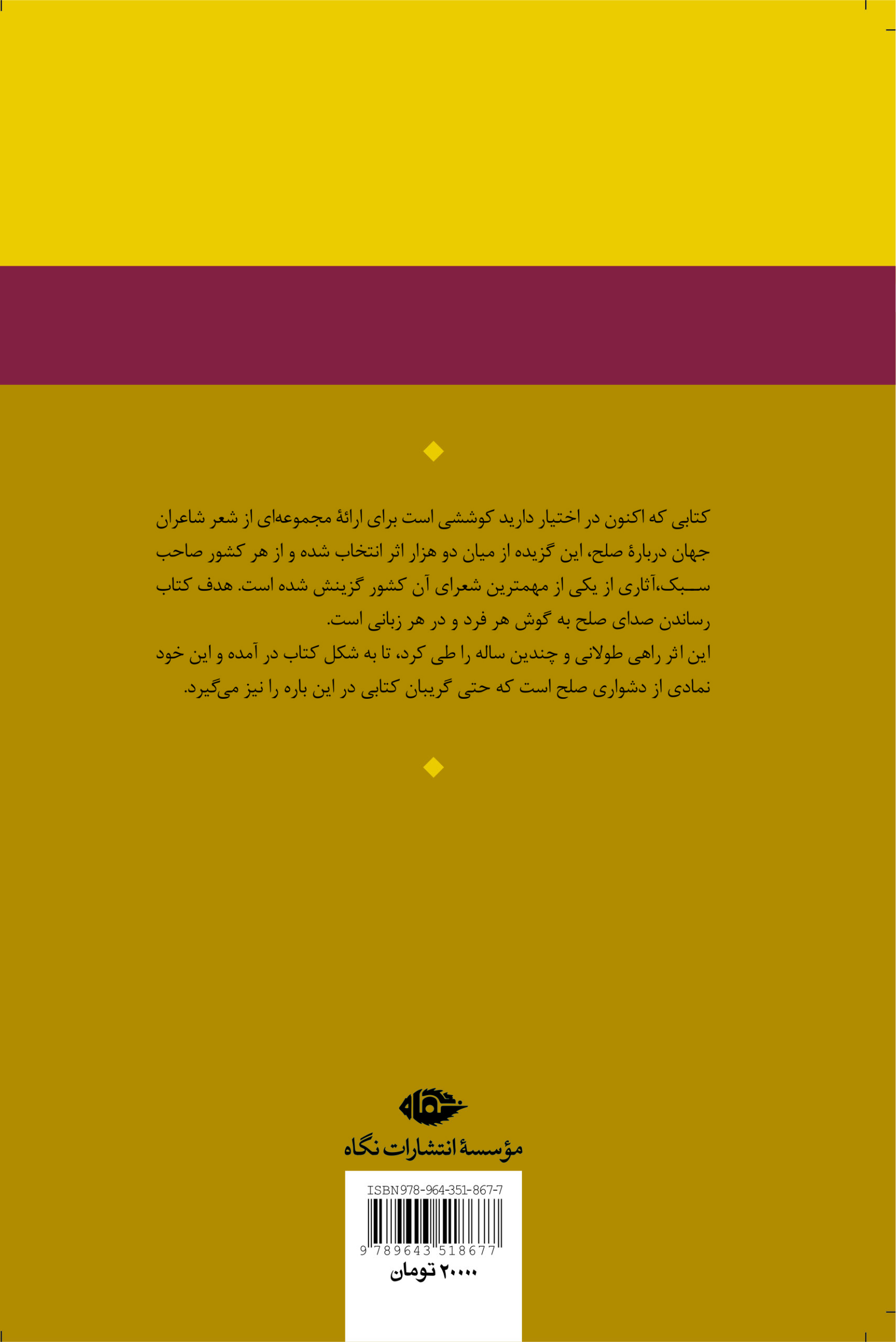
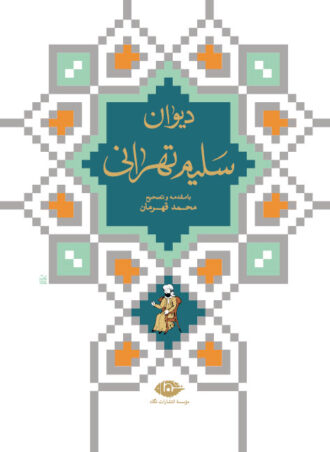
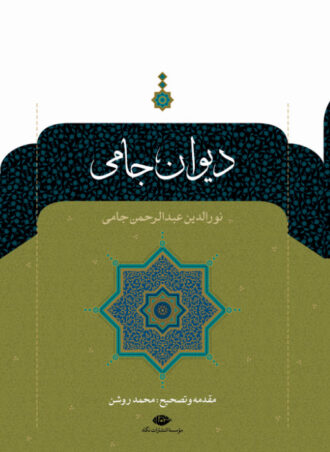
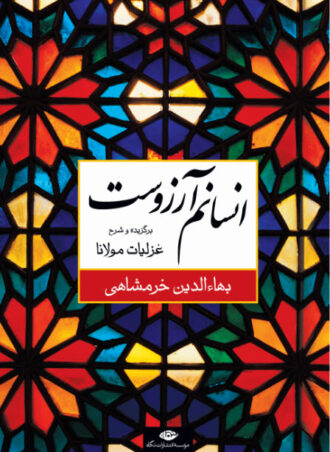
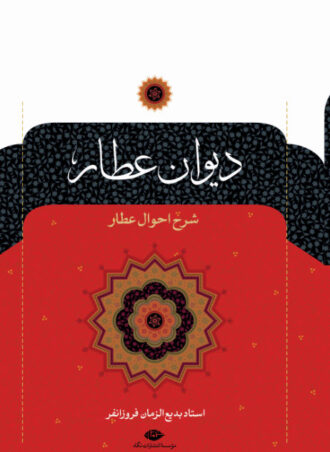
دیدگاهها
هیچ دیدگاهی برای این محصول نوشته نشده است.